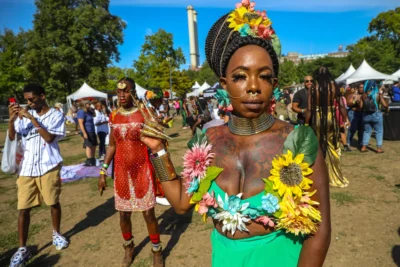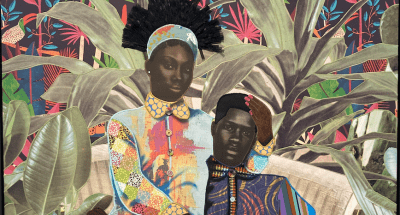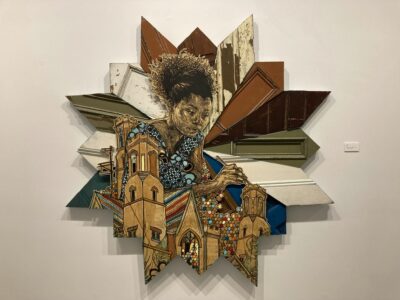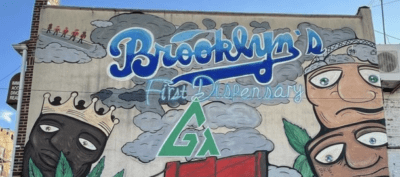Courtesy Man on Man
Man on Man rocks out with their … well, you know
Joey Holman and Roddy Bottum discuss love and death in the time of Covid, their DIY album and expanding representation in gay music
Man on Man started out as music therapy on the road trip from hell.
When musicians Joey Holman and Roddy Bottum packed up a white pickup and pulled away from their Brooklyn home at the beginning of the Covid-19 outbreak, they had no idea they wouldn’t return for almost a year. As the couple drove cross-country to Southern California to care for Holman’s ailing mother, they watched the rest of the world fall apart in real time. Somewhere around Texas, they decided music would be the thing to keep things together for them. Holman had formerly played guitar in the alt-rock bands Cool Hand Luke and Holman; Bottum is an alum of Faith No More and Imperial Teen. But quarantined in Oxnard, California, with just each other and some recording gear they had ordered, they spent the year supporting each other through grief, experimenting with a new musical partnership, and building a virtual family of gay men who love to rock.
They started out writing love songs to each other and shooting phone videos of themselves playing on the beach and dancing around the house in tighty-whities. Their vulnerability and emotional honesty, as well as the kind of body positivity (two middle-aged men blissfully comfortable in their hirsuite, not-exactly-chiselled glory) not often seen in gay or any music, quickly spread from a few shares in their social media circles to the support of a passionate online fan base. That unexpected community inspired them to create Chosen Family, a website and zine where they plan to cultivate LGBTQ+ creative expression from around the world.
Now they’re back in Brooklyn and have released Man on Man, their self-titled first album, earlier this month. The collection pairs tender ballads—”I don’t mind the weight of/any part of your body on mine”—with explicit, growling anthems—“I pulled your shorts down/I knelt before my swelling king/I took in everything.” Call it a rock opera of gay love. The end of lockdown has them thinking about how to showcase their whole vibe in live shows, with an eye toward iconic gay venues around the city. This interview has been edited for flow and clarity.
One of the ways I’ve seen the album described is “transcending what we know of gay music.” How are you trying to push beyond what’s already been done?
Holman: Hah! That’s a big question. Representation is really important, and it’s not just queer representation in the straight world, its also representation in the queer world. There hasn’t been a band that looks like Roddy and me, in terms of our age difference, in terms of the fact that we’re a couple making love songs to each other, our body types, our videos. A lot of people, especially queer people, are afraid to step out into the world because it’s so full of critiques, and everyone is pretending to be cool [so you] worry about how people will perceive you, and that makes you not do anything at all.
Bottum: Music in the gay genre is such a specific pigeonhole. It’s associated with a lifestyle gay people are typically connected to: like going out to the disco and dancing. We love dance music. But we are two gay guys who love rock music. I think that is for sure underrepresented in gay music. A lot of people associate gay music with the sort of UUNTtss UUNTtss UUNTtss dance music. When we put out our first video we got a lot of responses from people really happy to see gay represented in another way, in a rock world.
This album started as something really personal for you two. After the music connected so strongly with listeners, did that change what you wanted to do with the band?
Bottum: When we started making music, we’d been a couple for about a year and we hadn’t done it before. So it was sort of a leap of faith, a wobbly, fragile place to start from. We were really tentative with each other, and we were really damaged from Covid. We’d just driven across the country, we’d both had a lot of death in our families. People getting on board and appreciating and thanking us for doing what we were doing forced us to acknowledge our place in the community of queer culture and turned our project into something way different. Now with our record coming out we’re also releasing a zine based on the community and all of the people who follow us, who we’re calling our Chosen Family, with artwork and prose and photography, and we compile it to give our community a chance to represent themselves. It’s turned into more of a global sense of queer culture for us. We were able to hold onto those fragile beginnings, but over time it became a different thing.
So your Chosen Family project really evolved out of that response from the community?
Holman: What Roddy and I were doing, it’s like, yeah it’s about us, we’re making the music, the songs are about each other. But the community that we formed through these conversations online, it was very apparent early on that there wasn’t a healthy and nurturing community for people to be in that they could express their art or felt they could be seen or heard. There’s a lot more places we’re going to go with it; it’s not just a pen pal program or a zine. Chosen Family is really shaping the way Man on Man exists, and how Roddy and I think about what we’re going to do in the future. It’s going to affect where we play live shows, what that looks like, it’s going to affect the merchandise, it affects everything.
You’ve said “love is universal but gay love is specific.” What about your music do you think about specifically resonates with the gay community?
Holman: There is this unapologetic indulgence in things we naturally like. We’re expressing ourselves. Queer people are constantly figuring out who they are and how they belong, and because of that, we’re very expressive; we’re trying to figure out what it means to be queer in this very straight world. And the pursuit is more about self-understanding, of growth and connectedness. With our music, what we do is purely what we want to do, and queer people respond to that very well. It’s why queer people respond very well to pop stars and cabaret legends, just people who are genuinely themselves. We’re putting ourselves out there in a way not a lot of other people haven’t before. We’re writing cheesy love songs to each other.
Do you have plans to do some live performances now that things are opening back up?
Bottum: We made the record by ourselves; taking it to the next level and performing it is going to be a challenge. We’ve agreed we want to bring a whole band into the process; that in itself is a big change. We haven’t talked in terms of presentation so much. At one point in quarantine when it looked like all of our performances would be virtual, we had a concept where we would go to all of the different gay historical venues and perform sets there. Like there’s a store on 8th Ave called The Blue Store that’s like a real cruising zone where guys go to watch porno in videos booths, and we thought that would be great to go in and perform a set there. We wanted to perform at The Eagle, sort of the quintessential New York gay bar, we wanted to do a performance in the Vale of Cashmere in Brooklyn, which is a [part of Prospect Park] where historically queer men of color have gone to cruise. Now we’re moving out of that realm of virtual performances, so suddenly we’re in a place where we can perform live.
One of my favorite tracks on the album is the last one, “It Floated;” I loved the hopeful, turning-the-corner feel it had. Through everything you experienced making this album, was there a permanent change in direction from where you think you would have been headed if there were no Covid?
Bottum: I think we took a lot of turns, but it was really the circumstances in the world, what we were going through as a couple. We were survivors, a lot of people had died in our lives, and people continue to die. The trajectory of the songs, of the record, the way it started and ended, we were just pushed in those directions by the circumstances. I’m glad you find the song hopeful, we did too, and it did seem apt to end the record in a way that was seeing the light at the end of the tunnel.
You might also like 


























